The German men’s football team is one of the strongest teams in the world. This is the most successful team in the World Cup or Euro playgrounds. This place has produced great strikers of world football. These include “King of Bombs” Gerd Muller, “King of Heads” Miroslav Klose or “Space Thief” Thomas Muller. Different generations of players but all played prominently, bringing success to German football. Here, bestsoccertips will statistics the top 10 germany all time top scorers.
Top 10 germany all time top scorers
1. Miroslav Klose
Miroslav Klose is the highest goal scorer for the German national team. The striker, born in 1978, made his debut for the German national team in 2001. Klose is also the greatest goal poacher in the history of the World Cup with a record of 16 goals across 4 tournaments from 2002 to 2014. This marksman bid farewell to his international playing career after winning the World Cup with Germany in 2014.
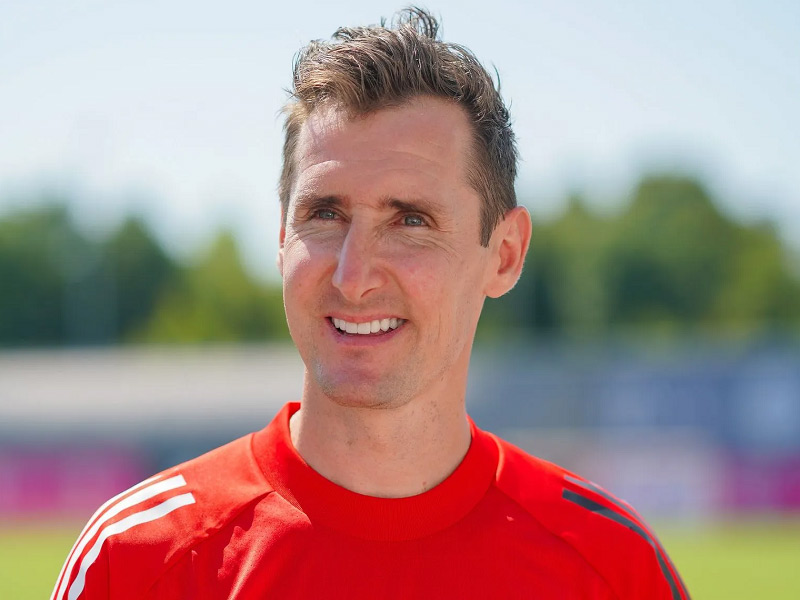
Klose is renowned for his exceptional heading ability despite his height of just 1.82 meters. His intelligent positioning and deadly headers have often resulted in crucial goals for the German national team. His record of 71 goals in 137 appearances for the national team is a milestone that will likely stand for a long time.
2. Gerd Müller
Gerd Muller’s prolific goal-scoring record in the colors of the German national team is the envy of any striker. With 68 goals scored in 62 appearances for the national team, he held a record that stood for over 40 years in German football until it was broken by Miroslav Klose on June 7, 2014.
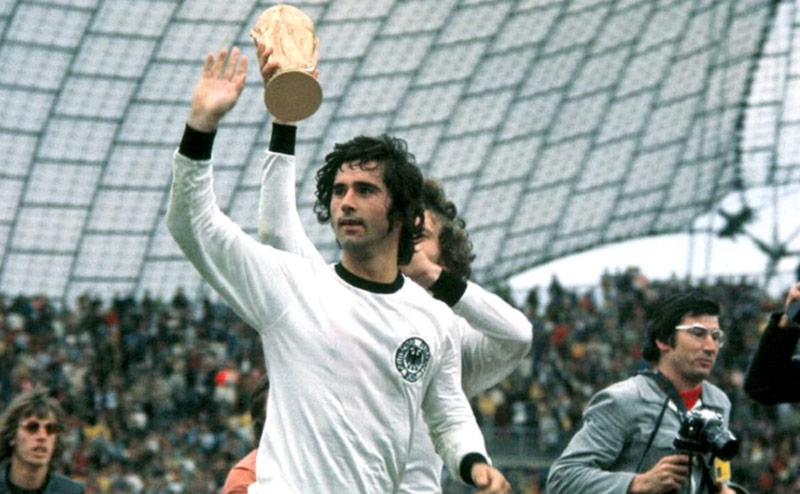
Gerd Muller earned the nickname “Der Bomber” for his incredible goal-scoring feats throughout his career. Playing for three clubs including 1861 Nordlingen, Bayern Munich, and Fort Lauderdale Strikers, Müller’s 15-year spell at Bayern Munich saw him score 398 goals in 453 matches. Across his entire career, he netted a staggering 487 goals in 555 appearances.
3. Lukas Podolski
Lukas Podolski, one of Germany’s celebrated footballers, made his debut for the national team on June 6, 2004, in a match against Hungary. Over 13 years representing the national team from 2004 to 2017, Podolski made his mark with 130 caps and 49 goals, averaging 0.38 goals per game.
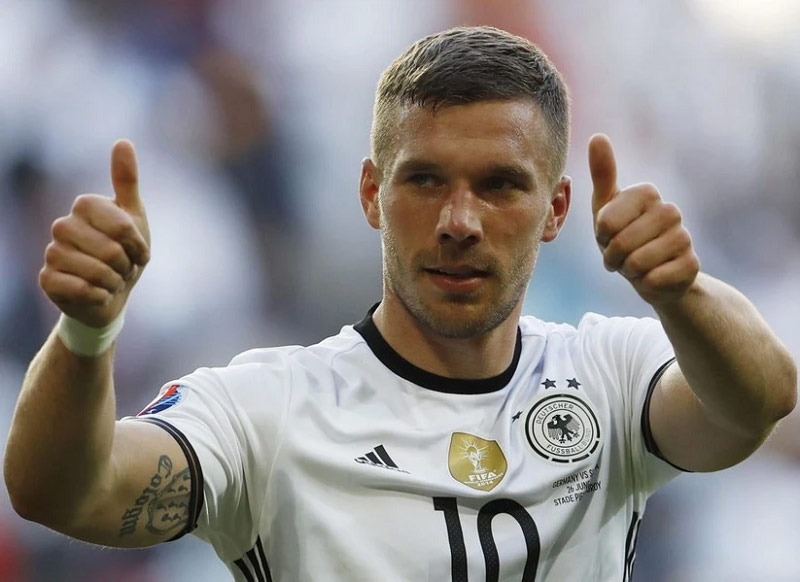
Podolski, originally of Polish descent, endeared himself to German fans following his impressive performance in the 2006 World Cup. He was awarded the Best Young Player of the tournament and became a focal point of attention with his powerful left-footed strikes and flamboyant playing style. With his potent and forceful style of play, Podolski earned the affectionate moniker “The Prince of German football” from fans.
4. Rudi Völler
Rudi Völler was one of Germany’s premier forwards in the 1980s. He began his international career by representing the German national team in 1982 and concluded it in 1994. In his 12 years with the national team, Völler scored 47 goals in 90 appearances, with an average of 0.52 goals per game.
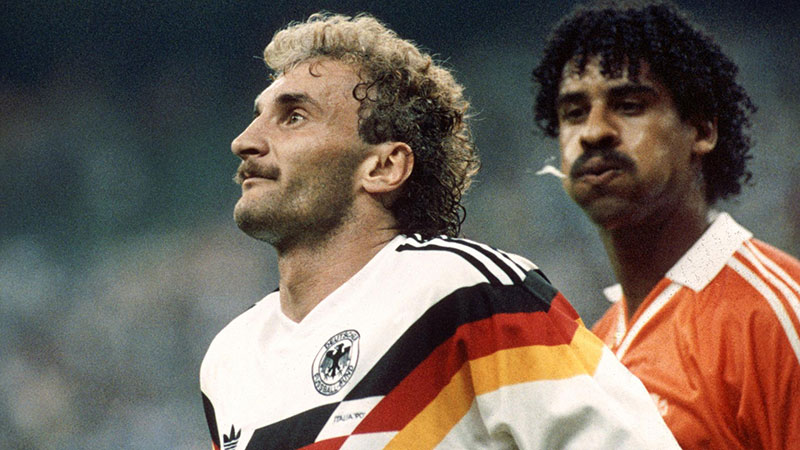
Völler was not only an outstanding player but also a vital part of Germany’s success. He contributed to Germany’s victory in the 1990 World Cup, where Germany claimed its third FIFA World Cup trophy. Additionally, he played a role in Germany’s campaigns in the 1986 World Cup and Euro 1992, reaching the finals but falling short of clinching the title. These are the remarkable achievements of a hero in German football history.
5. Jürgen Klinsmann
The success story of German football in recent years is truly remarkable. And the man who laid the groundwork for this transformation, bringing new strength to the German national team, is Jürgen Klinsmann. During the 2006 World Cup, he brought a fresh approach to Germany’s style of play, not only making the team stronger but also injecting excitement and rejuvenation into the fans.
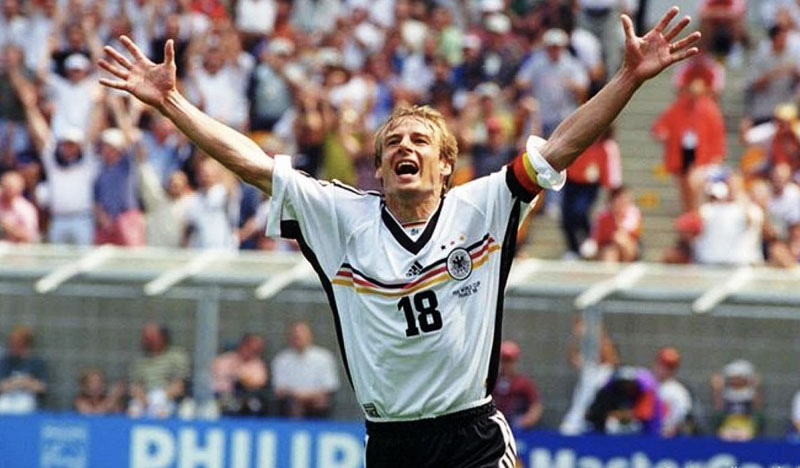
In addition to his successful coaching career, Klinsmann is also renowned as an exceptional forward. He made his debut for the German national team in 1987. Over 11 years representing the national team, he made 108 appearances and scored 47 goals, with an average of 0.44 goals per game.
Klinsmann left an indelible mark in the history of the German national team with crucial goals and major titles. He helped Germany win the 1990 World Cup and Euro 1996. However, there were also setbacks, such as in the Euro 1992 final, where Germany fell short. These are the memories and successes that Jürgen Klinsmann brought to German football.
6. Karl-Heinz Rummenigge
Karl-Heinz Rummenigge is one of the legends of German football and a symbol of Bayern Munich. In the history of the German national team, Rummenigge left a special mark. He began his international career in 1976 and concluded it in 1986.
During his 10 years with the national team, Rummenigge scored 45 goals in 95 appearances, with an average of 0.47 goals per game. His career was marked by significant successes, including being a member of the Germany team that won Euro 1980.
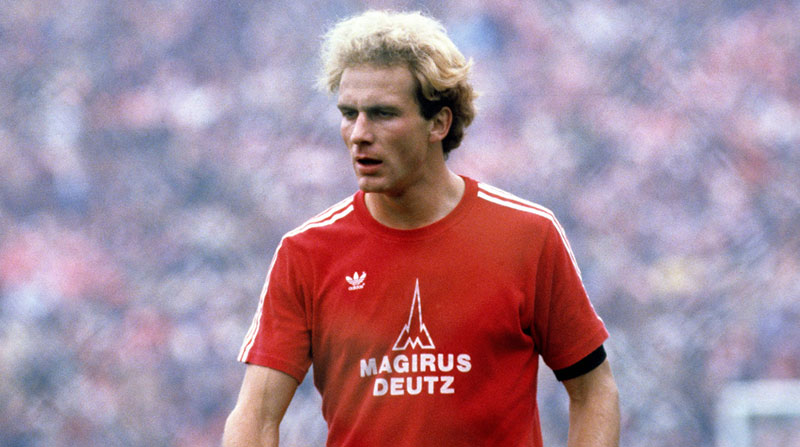
However, it wasn’t all smooth sailing for Rummenigge and the German national team. He also experienced bitter disappointments, such as finishing as runners-up in both the 1982 and 1986 World Cups. These failures were not only personal disappointments but also shared by the entire nation of Germany. Nevertheless, Rummenigge’s career continued to shine brightly and remains an integral part of German football history.
7. Uwe Seeler
Uwe Seeler is an indispensable legend in the history of German football, especially during the period from 1960 to 1970. Born in 1936, Seeler is known as an icon of Hamburger SV and one of the greatest players of his generation. Between 1953 and 1972, Seeler scored no fewer than 404 goals in 476 matches, an impressive feat that any player would dream of achieving.
On the international stage, Uwe Seeler was equally impressive. He dedicated himself to the German national team for 16 years, from 1954 to 1970. During that time, Seeler scored 43 goals in 72 matches, with an average of 0.60 goals per game. However, despite his significant contributions to the German national team, Seeler was unlucky not to win any titles with his national team.
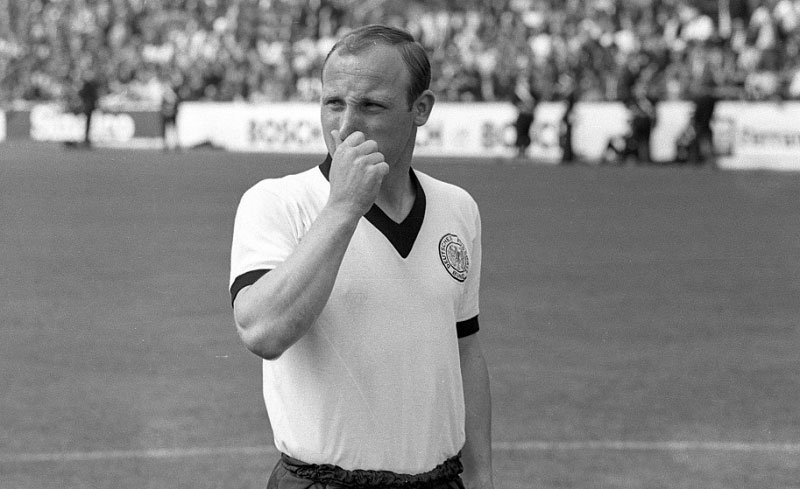
Nevertheless, despite the lack of major titles with the German national team, Seeler remains a hero in the hearts of football fans, with his dedication, perseverance, and exceptional talent. He and his teammates brought Germany close to the pinnacle in the 1966 and 1970 World Cups, reaching the finals and clinching the runner-up and bronze medals. Uwe Seeler is a great icon not only of German football but also of the global football community.
8. Michael Ballack
Michael Ballack is a typical central midfielder of German football in the 2000s. Although playing in the midfield, this midfielder’s goal-scoring ability is also noteworthy. With powerful long-range shots and high accuracy, coupled with strong aerial duels due to his tall stature, Ballack was one of the best central midfielders of his time.
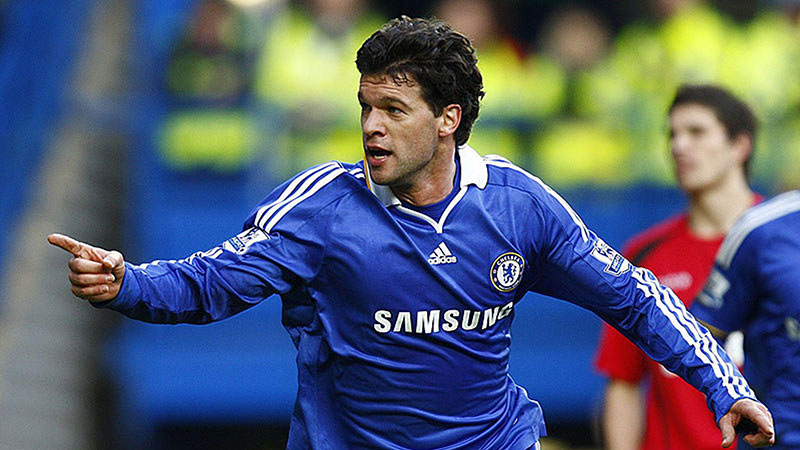
Ballack made his debut for the German national team in 1999 and over 11 years representing the national team, he made 98 appearances, scoring 42 goals. This midfielder was dubbed the “king of runners-up,” a nickname not taken lightly. Ballack did not win any titles with the German national team; he finished as runners-up in the 2002 World Cup, Euro 2008, and won the bronze medal in the 2006 World Cup.
9. Thomas Müller
Thomas Müller is a different kind of striker produced by German football. With a slender appearance and looking quite clumsy, few people dared to expect this player to shine or become a star of German football. However, under the guidance of top-class coaches like Luis Van Gaal and Pep Guardiola, Müller has become a fearsome goal poacher for both Bayern Munich and the German national team, earning the nickname “Space Invader”.
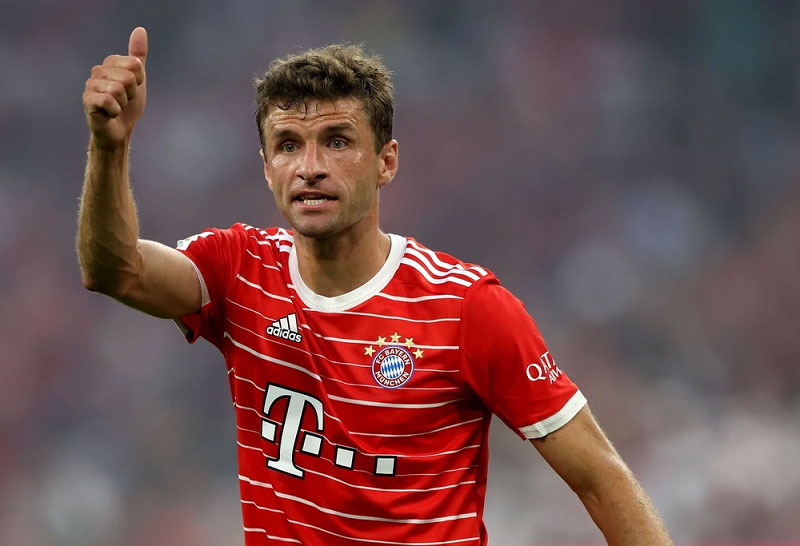
In the 2010 World Cup, his first appearance in the tournament, this forward scored 5 goals and won both the Golden Boot and the Best Young Player award. In Germany’s historic World Cup 2014 triumph, Müller also contributed 5 goals, bringing his total goals in World Cup tournaments to an impressive 10.
Having played 106 matches for the national team, Müller has scored a total of 39 goals, and this record may continue to improve as he remains a trusted figure for coaches.
10. Oliver Bierhoff
The first golden goal in the history of the European Championships left an indelible mark when Oliver Bierhoff scored against the Czech Republic in the Euro 1996 final. It was a historic moment that brought precious championship glory to German football, and Bierhoff became a legend in his own right.
Oliver Bierhoff was not only a talented forward for German football but also a special figure with international recognition at clubs abroad like Udinese and AC Milan. Born in 1968, he represented the German national team for 6 years, from 1996 to 2002, and during that time, he scored 37 goals in 70 matches. One of Bierhoff’s most memorable goals was the golden goal in 1996, a goal that entered legend and is still remembered by subsequent generations.
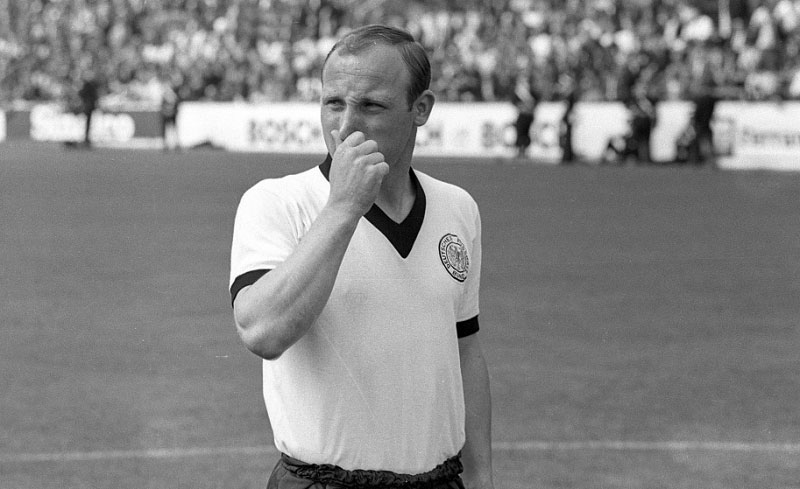
In addition to the Euro 1996 championship, Bierhoff also achieved other successes with the German national team. He helped the team to a runner-up finish in the 2002 World Cup, demonstrating his determination and talent in historic matches for German football. Oliver Bierhoff, with his significant contributions and memorable moments, has carved his name into the hearts of fans and become an icon in the history of German football.
Conclude
Above is an article to share with you the top +10 Germany all time top scorers that we synthesize to share with readers. Hopefully, the article has brought the most useful and interesting information about the strikers in the history of the German football league. Thank you for following our article!




